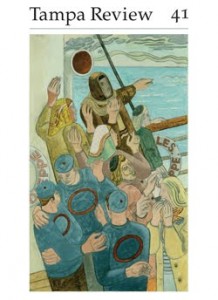 Tampa Review 41 offers a unique volume by pairing contemporary stories and poems with antique art from the fifteenth century and the early twentieth century, as well as a special sampling of art from the Vorticist movement, a “lively alliance of literary and visual artists before World War I that included Ezra Pound, T. S. Eliot, Wyndham Lewis, and a famous literary magazine called Blast.”
Tampa Review 41 offers a unique volume by pairing contemporary stories and poems with antique art from the fifteenth century and the early twentieth century, as well as a special sampling of art from the Vorticist movement, a “lively alliance of literary and visual artists before World War I that included Ezra Pound, T. S. Eliot, Wyndham Lewis, and a famous literary magazine called Blast.”
New Lit on the Block :: Urban Confustions
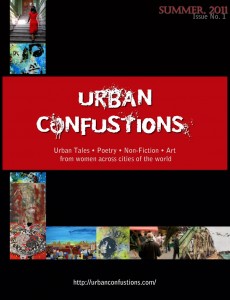 Urban Confustions is a biannual print and PDF (Lulu) publication, featuring “urban tales, poetry, non-fiction, and art from women writers and artists living in urban cities of the world.” Staffing the publication are Editors Rheea Mukherjee and Shilpa Kameswaran, Art Editor Tulika Ladsariya, and Rabia Mehta, Publicity and Marketing. Urban Confustions also holds public readings in various cities twice each year.
Urban Confustions is a biannual print and PDF (Lulu) publication, featuring “urban tales, poetry, non-fiction, and art from women writers and artists living in urban cities of the world.” Staffing the publication are Editors Rheea Mukherjee and Shilpa Kameswaran, Art Editor Tulika Ladsariya, and Rabia Mehta, Publicity and Marketing. Urban Confustions also holds public readings in various cities twice each year.
Each month, Urban Confustions “spotlights” an author or artists with a bio and a link to specific works by each. Featured thus far: Patricia Lee Martinovic, Teresa Chuc Dowell, Anna Saini and Emily Rutledge.
The first issue of Urban Confustions features works by Amelia Whitcomb, Sarah Rosenberg, Anna Saini, Jenny Fan, Rohini Sahni, Rachel Noelani Bovee, Shilpa Kameswaran, Tulika Ladsariya, Anna Cherednikova, Diane Ponder, Suzanne Hilal, Emily Rutledge, Archana Prasad, Jasmine Kwong, Susan Redekar, Teresa Chuc Dowell, Rabia Mehta, Jina Joan D’cruz, Shelly Bhiol Sood, Sonia Sarkar, Bo Melissa Schwabacher, Tishani Doshi, Janice Sapigao, Srividya Suryanarayanan, Prasanna Surakanti, Gathima Asghar, Ambika Ananth, Sampada Chavan, Patricia Lee Martinovic, and an interview with author Brinda Charry.
Urban Confustions invites women living in the urban centers of the world to submit fiction, non-fiction, poetry and art for their winter issue. Deadline for submissions is November 10.
Manoa: Voices of the Okinawan Spirit
 The newest issue of Manoa is Living Spirit: Literature and Resurgence in Okinawa. The publication is a collection of works from the Ryūkyūs, “Most of which have never been translated into English, or are newly translated for this volume. This issue is a “sister” volume to Manoa 2009, Voices from Okinawa – a collection of plays and essays by Okinawan Americans. In addition to the written works, this Living Spirit issue includes a series of photographs by Higa Yasuo, whose subjects include three decades of his study and recording of ancient and sacred religious festivals of Okinawa. Visit the Manoa Voices of the Okinawan Spirit blog for more information.
The newest issue of Manoa is Living Spirit: Literature and Resurgence in Okinawa. The publication is a collection of works from the Ryūkyūs, “Most of which have never been translated into English, or are newly translated for this volume. This issue is a “sister” volume to Manoa 2009, Voices from Okinawa – a collection of plays and essays by Okinawan Americans. In addition to the written works, this Living Spirit issue includes a series of photographs by Higa Yasuo, whose subjects include three decades of his study and recording of ancient and sacred religious festivals of Okinawa. Visit the Manoa Voices of the Okinawan Spirit blog for more information.
Free eBook :: A Worker’s Writebook by Jack Matthews
 A Writer’s Writebook, in which 86-year-old author & distinguished writing professor Jack Matthews shares secrets & strategies about good storytelling, is free to download until Sept. 4 from his blog Ghostly Populations.
A Writer’s Writebook, in which 86-year-old author & distinguished writing professor Jack Matthews shares secrets & strategies about good storytelling, is free to download until Sept. 4 from his blog Ghostly Populations.
New Lit on the Block :: The Found Poetry Review
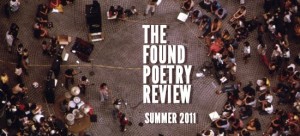 The Found Poetry Review is a quarterly online poetry journal “celebrating the poetry in the existing and the everyday.” FPR publishes “found poems, centos, erasure poems and other forms that incorporate elements of existing texts.”
The Found Poetry Review is a quarterly online poetry journal “celebrating the poetry in the existing and the everyday.” FPR publishes “found poems, centos, erasure poems and other forms that incorporate elements of existing texts.”
To clarify this to both their readers and writers itnerested in submitting works, FPR includes content with links on the definition of found poetry, examples of found poetry, and found poetry and fair use standards.
The Summer 2011 inaugural issue includes works by Christine Pacyk, Howie Good, Jill Crammond, Johnny Chinnici, Christina Burress, Jeanne Shannon, Mark Blaeuer, Clare Kirwan, Andrea J. Dickens, Claire Ferris, Jennifer Saunders, Guy Torrey, and Ed Higgins.
FPR is accepting submissions via Submishmash for the Fall 2011 issue, deadline September 30, 2011.
FPR is also holding their first contest, in which all contest submissions must be found poems derived from “How to Analyze People on Sight” by Elsie Lincoln Benedict and Ralph Paine Benedict, available as a free e-text through Project Gutenberg. The contest deadline is August 31, 2011.
Malahat Long Poem Prize 2011 Winners
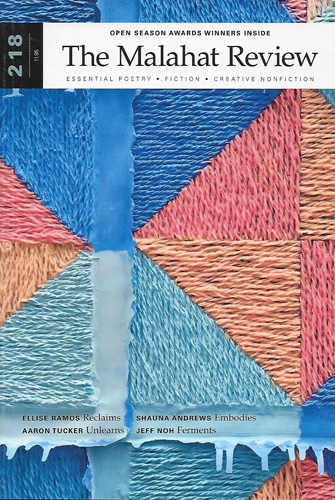 “The Constant Gardener” by Maggie Schwed and “The Sun Estate” by Julie Joosten were selected as the Malahat Long Poem Prize 2011 Winners. Each receives a $1000 cash prize as well as publication. Their poems appear in the most recent issue of Malahat (Summer 2011), and an interview with each appears on the Malahat Review web site.
“The Constant Gardener” by Maggie Schwed and “The Sun Estate” by Julie Joosten were selected as the Malahat Long Poem Prize 2011 Winners. Each receives a $1000 cash prize as well as publication. Their poems appear in the most recent issue of Malahat (Summer 2011), and an interview with each appears on the Malahat Review web site.
The Malahat Long Poem Prize is held every second year. The deadline for the next contest is February 1, 2013. Malahat Review sponsors a number of contests, guidelines for which can be viewed here.
New Lit on the Block :: Manor House Quarterly
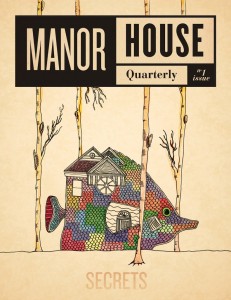 Organized by Dane Cardiel, contributing editor, Manor House Quarterly is “a collaborative effort of individuals whose diverse interests range from mixed-media to poetry, photography to music composition, story-telling to illustration, and more. The quarterly publication is simply the blending of these interests speaking toward a given concept.”
Organized by Dane Cardiel, contributing editor, Manor House Quarterly is “a collaborative effort of individuals whose diverse interests range from mixed-media to poetry, photography to music composition, story-telling to illustration, and more. The quarterly publication is simply the blending of these interests speaking toward a given concept.”
The first issue of MHQ is available online using Issuu and includes writing from Chloe Sparacio, Ethan Linstrom, Jeff Murray, Kohn Ashmore, Justin Wright, Andrew Gumm, Gaelan Gilbert, Sean Sand, Jared Callahan, Theron Allen Gregory, Vanessa Nelson, and Blake Nelson, and visual art from Casey Galanter, Frank Scott Krueger, Elisha Medina, Garrett Richardson, Jeff Allen, Kalika Kastein, Megan Gilbert, Scott Linger, Aubrey Perkins, Lauren Whisnant, and Emily Spencer.
Submissions of written content are being accepted for the next issue of MHQ, themed “1877.” The deadline is August 12.
Main Street Rag 2011 Poetry Book Award Winners
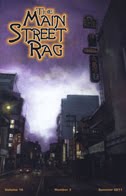 Elegies for New York Avenue by Melanie Henderson of Washington, DC. won the Main Street Rag 2011 Poetry Book Award.
Elegies for New York Avenue by Melanie Henderson of Washington, DC. won the Main Street Rag 2011 Poetry Book Award.
The deadline for the next Poetry Book Award is January 31, 2012. All entries are considered for publication.
Finalists/Runners up (in alphabetical order) are:
Banjo String Theory by Lynn Pattison, Kalamazoo, MI
Devil’s Messengers by David Allen Sullivan, Santa Cruz, CA
Dopplegangster by Patrick Moran, Fort Atkinson, WI
Heinz 56 by Amanda Reynolds, Pittsburgh, PA
Silver by Jason McCall, Tuscaloosa, AL
System of Hideouts by Heather McNaughter, Pittsburgh, PA
Zero is the Whole I Fall into at Night by Becky Thompson, Jamaica Plain, MA
Because the primary purpose for the MSR contest is to select manuscripts for publication, all of the finalists have been offered publication.
MSR also welcomes back Foster C. Hunter, who will be helping “Build Better Books” in the print and bindery operation.
Anobium Books Education Discount
Anobium Books is a Chicago-based, independent publisher founded in 2011 by Benjamin van Loon and “Mary J. Levine.” Anobium Books’ Education Discount Program will run indefinitely while supplies last, and offer free shipping and a 20% discount to Chicago Metropolitan Area students, faculty and staff. Beginning on July 31st, Anobium: Volume 1, which features new writing from Jonathan Greenause, Rich Ives, Joe Meno and others will be the first title available in the program.
New Lit on the Block :: Country Music
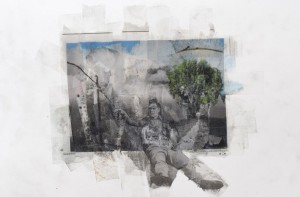 Country Music is an online biannual journal of poetry edited by Scott Abels. In addition to the poetry, each of the two issues now available include special features, such as “The Darkness and the Popcorn: Tyler McMahon’s Correspondence with Denis Johnson” (Volume 1), a selection of poems with an introduction (explanation) of the very quirky Barcelona Poetry Machine (Volume 2), and “Contributors Respond to Art and Economics” (Volume 2).
Country Music is an online biannual journal of poetry edited by Scott Abels. In addition to the poetry, each of the two issues now available include special features, such as “The Darkness and the Popcorn: Tyler McMahon’s Correspondence with Denis Johnson” (Volume 1), a selection of poems with an introduction (explanation) of the very quirky Barcelona Poetry Machine (Volume 2), and “Contributors Respond to Art and Economics” (Volume 2).
Issues #1 and #2 include works by Dan Chelotti, Sally Molini, Jennifer H. Fortin, Nate Pritts, Angela Veronica Wong, Alen Hamza, Donald Illich, Jon Thrower, Ron Riekki, Matt Ryan, Tyler Gobble, Peter Jay Shippy, Brandi Homan, Rob MacDonald, Rich Murphy, Kyle Thompson, Katie Condon, Andrew Morgan, Philip Byron Oakes, Francis Raven, Michael Schiavo, Clay Matthews, Lucy Biederman, Matt Hart, Samuel Day Wharton, Peter Davis, Amber Nelson, Jim Goar, and Jackie Clark.
Submissions are currently open “with no firm guidelines.”
[Issue #2 Art by Vince Hazen]
Fact-Simile Trading Cards
 In addition to their twice annual, large-format (8.5×11) literary journal, Fact-Simile has brought back their of Poetry Trading Cards. Printed on traditional trading card stock with a plastic sleeve, there are several ways to get them in your hands – 99 cents each or $10 for the year (+s/h). You can still subscribe now and get the “back issues” as well as receive monthly delivery for the remainder of the year. Cards from the 2010 series are also still available.
In addition to their twice annual, large-format (8.5×11) literary journal, Fact-Simile has brought back their of Poetry Trading Cards. Printed on traditional trading card stock with a plastic sleeve, there are several ways to get them in your hands – 99 cents each or $10 for the year (+s/h). You can still subscribe now and get the “back issues” as well as receive monthly delivery for the remainder of the year. Cards from the 2010 series are also still available.
The 2011 Poetry Trading Cards thus far:
January/Nathaniel Tarn
February/Charles Bernstein
March/Rachel Blau DuPlessis
April/Joanne Kyger
May/CA Conrad
June/Amiri Baraka
July/Charles Alexander
New Lit on the Block :: 100 Word Story
 100 Word Story is a new online literary publication edited by Grant Faulkner and Lynn Mundell, with the goal to publish monthly issues of stories and an annual anthology of 100 100-word stories. The publication features prose, prose poems, and interviews.
100 Word Story is a new online literary publication edited by Grant Faulkner and Lynn Mundell, with the goal to publish monthly issues of stories and an annual anthology of 100 100-word stories. The publication features prose, prose poems, and interviews.
100 Word Story currently includes works by Paul Strohm, Barbara Goldberg, David Cotrone, Karen Benke, Janice Lynch Schuster, Kate Hill Cantrill, Kermit Moyer, and an interview with Paul Strohm on “the art of the 100 word story.”
100 Word Story offers a monthly theme as well as a monthly photo prompt. Submissions are open and accepted through Submishmash.
What I’m Reading :: 77 Reasons Why Your Book Was Rejected
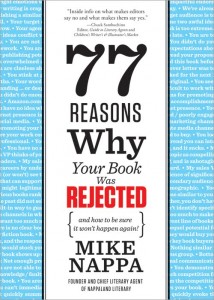 77 Reasons Why Your Book Was Rejected by author and agent Mike Nappa (Nappaland Literary Agency) takes a hardcore look at editorial, marketing, and sales perspectives on why a book is rejected. His tone is quick-witted and conversational, and he is in no way here to hold your hand and make you feel better about your rejections. He is in-your-face (“Your Writing is Crap”), realistic (“Your Book Costs Too Much to Make”), and the helpful voice of a friend you need (“You Aren’t Able to Significantly Differentiate Your Book from the Competition”).
77 Reasons Why Your Book Was Rejected by author and agent Mike Nappa (Nappaland Literary Agency) takes a hardcore look at editorial, marketing, and sales perspectives on why a book is rejected. His tone is quick-witted and conversational, and he is in no way here to hold your hand and make you feel better about your rejections. He is in-your-face (“Your Writing is Crap”), realistic (“Your Book Costs Too Much to Make”), and the helpful voice of a friend you need (“You Aren’t Able to Significantly Differentiate Your Book from the Competition”).
Nappa follows up each of the 77 Reasons Why with “What you can do about it,” offering two or three tips for each reason. He notes early on that you may not like what he has to say, but he is being as honest as he can. The book begins, “I make it my goal to reject every book proposal you send me in sixty seconds or less.” This may sound arrogant, but keep reading: “The sad part about this goal of mine is that it’s remarkably easy to accomplish. Too easy, in fact.” Nappa himself has had numerous books published, but also received thousands of rejections, so he isn’t taking any kind of industry-moral high road here. He really is talking to readers like the friend they need to guide them through this seemingly mysterious process. This book, he says, is about “learning why we fail – and then turning that knowledge into success the next time around.” Or at least making that rejection less of a bitter pill to swallow.
Given the 77 reasons in here, only a few could be taken as personal – the rest, he points out, are purely business (which might explain why so many find it “mysterious”). Nappa offers a detailed explanation of what happens once an acquisitions editor takes a book on to pitch to the publisher. It’s not pretty, and it explains why some books never make it past that stage. “Remember,” Napa writes, “publishing is an industry – a business that has at its core the innate desire for survival. And, as for any business, survival means profit. A publishing house that doesn’t actively pursue profitability – no matter how noble or sublime its content goals – simply won’t be publishing books for very long.”
Nappa addresses reasons for rejection from three main perspectives: editorial, marketing, and sales. Some of the examples he provides from his years of experience are shockingly funny (as in, someone really did that?). But what may seem like the “right” approach from the writer trying to pitch a book is exactly what knocks that book out within those first sixty seconds of consideration. Nappa warns his readers, “I will always be honest with you in this book. Sometimes that may make you angry with me. I apologize in advance…but please don’t take it personally. I’m just trying to help you by sharing from my twenty-plus years of experience in publishing.”
Nappa welcomes readers to disagree with his advice if they have had different experiences, which is a good reminder that no one “advice” book of this kind is in any way absolute in being right or naming what is wrong. There are as many experiences with publishing as there are writers trying to get published and agents accepting or rejecting those attempts.
While it seems like this book focuses on the goal of writers who want to run with the big dogs in publishing, that might just be because of Nappa’s work experience in the more cut-throat levels of the industry. Many of his best stories (both of failures and successes) come from working with bigger publishing houses. Still, Nappa offers solid advice for ALL writers to consider, whether pitching to an agent or directly to a small, indie publisher, like those listed on NewPages.
I am personally not a writer trying to get published, but found Nappa’s book extremely insightful (in addition to entertaining), just reading about his work as an agent and acquisitions editor, and working in the industry with other major decision-makers. It’s not a book that needs to be read cover to cover; with each reason and advice on what to do about it taking only a few pages each, it’s easy to pick out specific issues of interest.
77 Reasons is available online from Sourcebooks, where you can also see the full table of contents and read an excerpt from the book.
Avery Staff Changes & Contest Winners
 The newest issue of Avery welcomes Nicolette Kittinger as co-editor, while saying good-bye to Emma Straub and Michael Fusco, and Founding Editor Andrew Palmer stepping over to become a reader.
The newest issue of Avery welcomes Nicolette Kittinger as co-editor, while saying good-bye to Emma Straub and Michael Fusco, and Founding Editor Andrew Palmer stepping over to become a reader.
The issue includes winners of the Second Annual Small Spaces Fiction Prize as judged by Junot Diaz: Winner Benjamin Reed, and Runners-Up Pamela Balluck and Kurt Scott, and the winners of A Very Avery Flasher Contest: Winner B.C. Mitchell, Runner-Up Kirsten Clodfelter, and Honorable Mention Benjamin Reed. (Mitchell’s and Reed’s ‘Flashers’ are available on the Avery website.)
[Cover art by Abi Daniel.]
New Lit on the Block :: Catfish Creek
Catfish Creek is a national undergraduate literary journal from Loras College intended as a showcase for undergraduate writers both nationally and internationally. Catfish Creek is currently accepting submissions of fiction, poetry, and literary nonfiction. Any student currently registered in an undergraduate program is eligible to submit. The reading period for Catfish Creek is Septermber 1 – November 15.
The staff of Catfish Creek currently includes Editor-in-Chief Brigette Yanes, Fiction Editor Sarah Riesberg, Nonfiction Editor Maria Rauen, Poetry Editor Annie Newberry, and Faculty Advisor William Jablonsky.
New Lit on the Block :: bioStories
bioStories is a new online literary web publication edited by Mark Leichliter, writer and freelance editor who publishes fiction, poetry, and essays under the pseudonym Mark Hummel.
bioStories features a blog-post publication of biographies, with some of the portraits featured on the main web site. bioStories does not look to feature the already overly-featured celebs and well-knowns; instead, Leichliter notes, “We particularly look for work that offers slices of a life that help the reader imagine the whole of that life, work that demonstrates that ordinary people’s experiences often contain extraordinary moments, visionary ideas, inspirational acts, and examples of success and failure that prove instructive. In short, we believe every life displays moments of grace.”
Currently, the site includes works by Murray Edwards, Kimberly Hamilton, Jona Jacobson, Hank Merrell, Peter Derk, and Wilmer Frey
Additionally, the site includes Noteworthy Bios that highlight inspiring stories of ordinary people’s lives that make it into the news as a “little reminder that there are people around us practicing life-changing and inpirational acts if only we pay attention.”
bioStories is open for submission or original, nonfiction work.
Kaleidoscope Animals Issue
 Issue Number 63 of Kaleidoscope: Exploring the experience of disability through literature and the fine arts, is themed “Animals That Make a Difference.” This is a great issue for animal lovers, from the editorial by Gail Willmott on her life-long love affair with cats, to Deshae E. Lott’s feature essay, “It’s Not About the Dog,” the issue is jam-packed with essays, poetry, fiction, and creative nonfiction all centered around animals: dogs, cats, rabbits, birds – with a particular focus on the human-animal bond in relation to issues of disability.
Issue Number 63 of Kaleidoscope: Exploring the experience of disability through literature and the fine arts, is themed “Animals That Make a Difference.” This is a great issue for animal lovers, from the editorial by Gail Willmott on her life-long love affair with cats, to Deshae E. Lott’s feature essay, “It’s Not About the Dog,” the issue is jam-packed with essays, poetry, fiction, and creative nonfiction all centered around animals: dogs, cats, rabbits, birds – with a particular focus on the human-animal bond in relation to issues of disability.
New Lit on the Block :: Plume Poetry
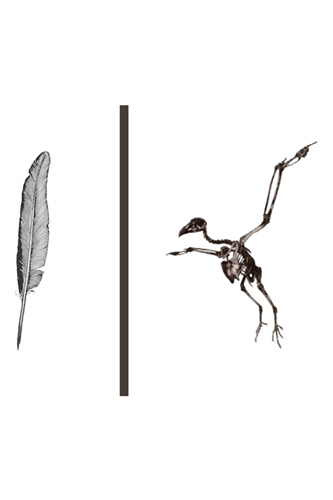 Daniel Lawless is the editorial effort behind the newly launched Plume, an online publication of poetry. Plume, Lawless writes, “is a magazine dedicated to publishing the very best of contemporary poetry,” and though the first issue is “expanded” to include 16 works, the monthly issues will be limited to 12 poems each.
Daniel Lawless is the editorial effort behind the newly launched Plume, an online publication of poetry. Plume, Lawless writes, “is a magazine dedicated to publishing the very best of contemporary poetry,” and though the first issue is “expanded” to include 16 works, the monthly issues will be limited to 12 poems each.
The Plume home page features a slideshow of quotes, short poems, aphorism, snippets, and excerpts of 50 words or fewer. Submissions of this content are accept as well as original poetry submissions for each issue. While Plume will be presented in English, international contributions are welcome, with plans for bilingual editions.
Issue one features poems by Stuart Dybek, Amy Gerstler, Mark Jarman, Kimberly Johnson, Christopher Kennedy, Nin Andrews, Maureen McLane, Rae Armantrout, Jean-Michel Maulpoix, Charles Bernstein, Alicia Ostriker, Carl Dennis, Terese Svoboda, Denise Duhamel, and G.C. Waldrep.
Issue 2 will include works by from Jay Parini, John Kinsella, Lawrence Raab, Linda Pastan, Paol Keineg, Stephen Dunn, Elaine Equi, David Huddle, Cornelius Eady, and others.
[Cover Art by Al Gorman]
Annalemma’s “Creation” Issue
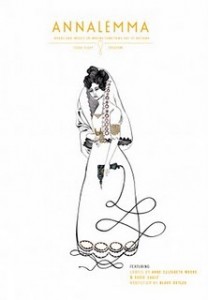 Issue Eight of Annalemma is themed “Creation” and came about, Editor Chris Heavener writes in the intro, when a friend of his suggested he “do an issue of Annalemma all about making things. It would be nonfiction focused. Maybe it would have a few fiction pieces thrown in there for fun, but the contents would consist mainly of profiles and interviews with woodworkers, chefs, designers, manufacturers, and artisans of all stripes. It would be a celebration of craft, of people who devote their lives to a trade and do what they do with grace, precision, and beauty.”
Issue Eight of Annalemma is themed “Creation” and came about, Editor Chris Heavener writes in the intro, when a friend of his suggested he “do an issue of Annalemma all about making things. It would be nonfiction focused. Maybe it would have a few fiction pieces thrown in there for fun, but the contents would consist mainly of profiles and interviews with woodworkers, chefs, designers, manufacturers, and artisans of all stripes. It would be a celebration of craft, of people who devote their lives to a trade and do what they do with grace, precision, and beauty.”
The resulting issue includes Barry Grass talking with Belgium artesian brewer Dany Prignon of the Fantôme Brewery, designer/dressmaker Jen O’Malley on the American history of the bridal gown, and author/activist Anne Elizabeth Moore on gender inequality in the world of comic books – among many other “creation” themed works. The issue is also features a generous amount of full-color artwork and photography throughout.
[Cover art by Amber Albrecht.]
The Hudson Prize 2011 Winners
 Black Lawrence Press has announced that B.C. Edwards has won The Hudson Prize with his short story collection The Aversive Clause. Edwards also submitted his poetry collection From the Cyclopedia of Recipes for the prize and Black Lawrence has also optioned to publish that manuscript as well.
Black Lawrence Press has announced that B.C. Edwards has won The Hudson Prize with his short story collection The Aversive Clause. Edwards also submitted his poetry collection From the Cyclopedia of Recipes for the prize and Black Lawrence has also optioned to publish that manuscript as well.
Finalist Valerie Bandura was also offered a contract for her entry Freak Show.
Poetry Finalists
Emily Rosko – Prop Rockery
Lindsay Illich – Anatomy Lessons
Rae Gouirand – Open Winter
Tony Trigilio – White Noise
Fiction Finalists
Elizabeth Kadetsky – The Poison That Purifies You
Emily Doak – Hatchlings
George McCormick – Salton Sea
Jennifer Cranfill – The Last of the Small Town Girls
Jessica Barksdale – Tuna for the Apocalypse
Randal Gentry – Evenings with Johnny Carson
Ron Tanner – Boom, Like That
Baltimore Review News
From SeniorEditor Barbara Westwood Diehl: The Baltimore Review was established in 1996 as a print journal and published two issues per year since that time. Recently, the journal has changed its editorial board and will now operate as an online journal with web-published work collected into an annual print issue.
Reading periods for Baltimore Review are August 1 through November 30 and February 1 through May 30. Plans are to begin publishing work online in February 2012.
Baltimore Review will also be having a contest for their online re-launch with the theme: Room. Poetry, fiction, and creative nonfiction entries will be accepted during the Aug-Nov reading period.
New Lit on the Block :: Aldus
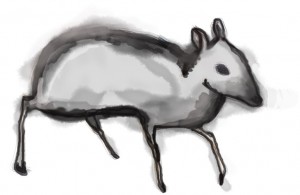 Aldus is Brown University’s new Undergraduate Journal of Works in Translation edited by Timothy Nassau and Matthew Weiss, who discuss the role of contemporary literature and literature in translation in their Letter from the Editors. “A translated work,” they write, “is always already finished to us; it presents itself as an emissary from a completed world, removed from the pettiness of one’s own language, literature, and culture–and no matter how it is perceived in its own land, it always appears unified in another language. As such, it stands above contemporary controversies, like a manuscript from antiquity or a message from the future. It brings into view the following: that a different kind of whole is possible.”
Aldus is Brown University’s new Undergraduate Journal of Works in Translation edited by Timothy Nassau and Matthew Weiss, who discuss the role of contemporary literature and literature in translation in their Letter from the Editors. “A translated work,” they write, “is always already finished to us; it presents itself as an emissary from a completed world, removed from the pettiness of one’s own language, literature, and culture–and no matter how it is perceived in its own land, it always appears unified in another language. As such, it stands above contemporary controversies, like a manuscript from antiquity or a message from the future. It brings into view the following: that a different kind of whole is possible.”
Aldus, then, is itself a different kind of whole, presenting works in translation in this first issue from Greek, Slovenian, Latin, Cambodian, Russian, Arabic, French, Spanish, Chinese, and Old English. The original work is sometimes provided, more than not, and the works vary from poetry to prose, an original essay in English by Dore J. Levy, and a translation of the People’s Statement from the protesters of Midan Tahrir, which was circulated on the internet and the streets of Egypt during the recent revolution.
Aldus – all 170+ pages of it – is available full-text online using Issuu. Print copies can also be acquired by contacting the journal.
Aldus will publish translations into English from any language, in any genre, from any time, and from any place, as well as essays on the art of translation.
Submissions for the fall issue are due by October 15, 2011. Proposals are also welcome.
Stunning Covers :: Palooka
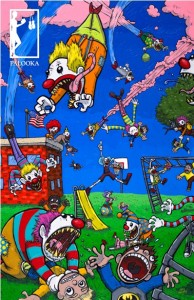 Palooka: Issue 2 – cover art, “Flying Clowns Descend on the Schoolyard” by Joe Harvasy (2008). I have a friend who is deathly afraid of clowns who would find this cover stunning in a very literal-psychological sense. I find the colors (great reproduction) and style to be the stunner; the clowns themselves – well, there’s some dark humor at work here I can appreciate. Havasy comments on the artwork: “The flying clowns painting was originally a print I did for a show titled ‘They’re Out to Get Me’ about childhood fears. I wanted to show clowns doing everything scary possible. Four years later the Alcove Gallery was having a show titled ‘Circus,’ and I decided to do a gigantic 2′ x 3′ painting of the clowns. The painting currently resides in Oslo, Norway, in the collection of Nicholas Paulik.”
Palooka: Issue 2 – cover art, “Flying Clowns Descend on the Schoolyard” by Joe Harvasy (2008). I have a friend who is deathly afraid of clowns who would find this cover stunning in a very literal-psychological sense. I find the colors (great reproduction) and style to be the stunner; the clowns themselves – well, there’s some dark humor at work here I can appreciate. Havasy comments on the artwork: “The flying clowns painting was originally a print I did for a show titled ‘They’re Out to Get Me’ about childhood fears. I wanted to show clowns doing everything scary possible. Four years later the Alcove Gallery was having a show titled ‘Circus,’ and I decided to do a gigantic 2′ x 3′ painting of the clowns. The painting currently resides in Oslo, Norway, in the collection of Nicholas Paulik.”
You Have 24 Hours to Submit!
You have 24 hours to submit to Longshot, the magazine created – from start to finish – in 48 hours.
This issue’s theme is: DEBT
There are several prompts available on the website – something for everyone, including data collection on how much debt you owe and when you think you’ll pay it off (using google docs survey form).
Good luck Longshot! See you done on Monday!
Endings :: Milk Money
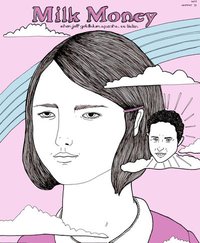 Milk Money Editors Maija Zummo & Ian Wissman wrote to say the print magazine, first published in 2007, would be ending after publication of Volume 9: Semper Ubi, Sub Ubi, claiming economic factors among other reasons. Online-only is not an option MM wants to pursue, but the editors say there may be some content there in the future, since Volume 10 had already been planned.
Milk Money Editors Maija Zummo & Ian Wissman wrote to say the print magazine, first published in 2007, would be ending after publication of Volume 9: Semper Ubi, Sub Ubi, claiming economic factors among other reasons. Online-only is not an option MM wants to pursue, but the editors say there may be some content there in the future, since Volume 10 had already been planned.
Fiddlehead All Fiction
 The Fiddlehead #248 is the Summer Fiction Issue and features works by Elisabeth Harvor, Bill Gaston, Alice Petersen, Douglas Glover, Katherine Govier, J.M. Villaverde, Forrest Orser, Matthew Swaye, ML West, Andrew Smith, Wayne McIntyre, F.W. Birt, Gregory Foran, Rea Tarvydas, Leon Rooke, Rebecca Rosenblum, and Clark Blaise. The issue also includes a full section of reviews of new and recent fiction titles. Table of contents is available on The Fiddlehead website.
The Fiddlehead #248 is the Summer Fiction Issue and features works by Elisabeth Harvor, Bill Gaston, Alice Petersen, Douglas Glover, Katherine Govier, J.M. Villaverde, Forrest Orser, Matthew Swaye, ML West, Andrew Smith, Wayne McIntyre, F.W. Birt, Gregory Foran, Rea Tarvydas, Leon Rooke, Rebecca Rosenblum, and Clark Blaise. The issue also includes a full section of reviews of new and recent fiction titles. Table of contents is available on The Fiddlehead website.
[Cover art Cover by R
The Long Poem / Series Issue
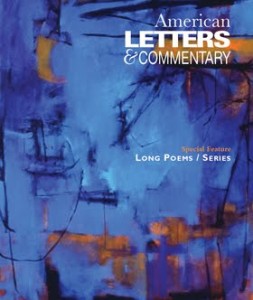 The newest American Letters & Commentary (Issue #22) includes a special feature dedicated to “the long poem/series.” In the introduction to the feature, Editors Catherine Kasper and David Ray Vance write: “In western literary culture, ‘The Long Poem’ is as ancient as the epic…For literary magazine editors, however, long poems or series can be problematic. Works that are interlinked and lengthy often run up against the financial realities of small press production. Even where money isn’t an issue and editors have plenty of pages to work with, they’re often reluctant to devote too much space to a single author. And so, long poems and series are largely eschewed in favor of work that can fit in the space of a page.” They go on to discuss Lynn Keller’s perspective about the perseverance and reinvention of the long poem as it continues today, and their decision to dedicate space to “longer” works in this issue.
The newest American Letters & Commentary (Issue #22) includes a special feature dedicated to “the long poem/series.” In the introduction to the feature, Editors Catherine Kasper and David Ray Vance write: “In western literary culture, ‘The Long Poem’ is as ancient as the epic…For literary magazine editors, however, long poems or series can be problematic. Works that are interlinked and lengthy often run up against the financial realities of small press production. Even where money isn’t an issue and editors have plenty of pages to work with, they’re often reluctant to devote too much space to a single author. And so, long poems and series are largely eschewed in favor of work that can fit in the space of a page.” They go on to discuss Lynn Keller’s perspective about the perseverance and reinvention of the long poem as it continues today, and their decision to dedicate space to “longer” works in this issue.
The special feature includes a series of oil paintings (full color) by Caryn Friedlander, and long poems or poems in a series by Cecily Parks, Laura Goldsteins, Dan Kaplan, Megan Kaminski, Darin Ciccotelli, Jenny Gropp Hess, Sarah Mangold, James Meetze, Ailish Hopper, Pattabi Seshadri, Terence Huber, Jakob Stein, Nathan Hauke, Alexandra Mattraw, Joyelle Mcsweeney, Rebecca Givens Rolland, and Steve Barbaro.
[Cover art by Caryn Friedlander.]
Daniel Nester on Origin Stories
“Every child relies on someone else to make ground for their origin story, where their body comes from. My first memory takes place in my grandparents’ backyard, where my mother is showing me a broken milk bottle. She tells me that I ‘have to use big people glasses now.’ No more bottles. It’s one of those maternal dupes, a necessary deception to move things along. My mother denies this ever happened. I remember it vividly, down to the poison ivy under the bush, brushing against my legs.”
Daniel Nester, from “The Writer is Present,” published in the independent online lit mag Painted Bride Quarterly #84
New Lit on the Block :: The Jet Fuel Review
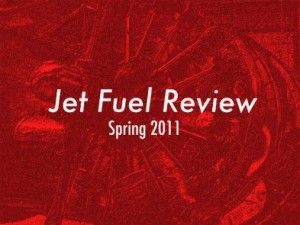 The first issue of Lewis University’s The Jet Fuel Review is now online. This student-run literary journal showcases poetry, prose, visual art, and other creative compositions from Lewis students to award-winning authors of books. The second issue of the review will publish in the fall and is open for submissions through September.
The first issue of Lewis University’s The Jet Fuel Review is now online. This student-run literary journal showcases poetry, prose, visual art, and other creative compositions from Lewis students to award-winning authors of books. The second issue of the review will publish in the fall and is open for submissions through September.
The inaugural issue includes:
Fiction by Lucile Barker, Mark Jacobs, Jane Lebak, George Miller, William Sullivan;
Poetry by William Allegrezza, Salvatore Attardo, Hadara Bar-Nadav, Mary Biddinger, Jaswinder Bolina, Jason Bredle, Marcel Brouwers, Meriwether Clarke, Patrick Culliton, Brandon Downing, Gail Eisenhart, Rich Furman, John Gallaher, Howard Good, Sheila Hageman, Brandi Homan, Audrey Keiffer, Alan King, Becca Klaver, Karyna McGlynn, Laura Merleau, George Miller, Jacob Oet, Emmanuel Pendola, Tonya Peterson, Diana Raab, Dean Rader, Michael Robins, Kathleen Rooney & Elisa Gabbert, Michael San Filippo, Patricia Seyburn, Fiona Sinclair, Sean Singer, Lawrence Sisk, Joseph Somoza, Jennifer Sweeney, Truth Thomas, Lina Ramona Vitkauskas;
Art by Kim Ambriz, Melissa Chicola, Julie Clack, Audrey Heiberger, William Hicks, Eric Lee, Grant Palmer, Tonya Peterson, Michael San Filippo;
And an exclusive interview with author Brigid Pasulka.
Weave Magazine: The Clothesline Insert
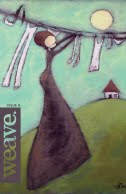
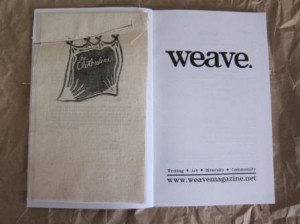 The newest issue of Weave Magazine (Issue 6) includes a unique insert – inspired by the cover art by deona fish. The insert is eight paper pages with a muslin cover, stamped with the art title “the clothesline.” It is sewn onto the inside front cover, the line of the stitch follows the clothesline on the cover art. The insert features the works of Andrew Knock, Rebecca Dunham, Sarah Machinak, Jane McCafferty, and Mary O’Donnell, and is, in its own way, a celebration and appreciation of the in-your-hand print publication. As Founding Editor Laura E. Davis notes: “With electronic publishing on the rise, Weave remains committed to print.” And readers like me will do likewise, with great appreciation for these creative endeavors.
The newest issue of Weave Magazine (Issue 6) includes a unique insert – inspired by the cover art by deona fish. The insert is eight paper pages with a muslin cover, stamped with the art title “the clothesline.” It is sewn onto the inside front cover, the line of the stitch follows the clothesline on the cover art. The insert features the works of Andrew Knock, Rebecca Dunham, Sarah Machinak, Jane McCafferty, and Mary O’Donnell, and is, in its own way, a celebration and appreciation of the in-your-hand print publication. As Founding Editor Laura E. Davis notes: “With electronic publishing on the rise, Weave remains committed to print.” And readers like me will do likewise, with great appreciation for these creative endeavors.
New Lit on the Block :: Still Point Arts Quarterly
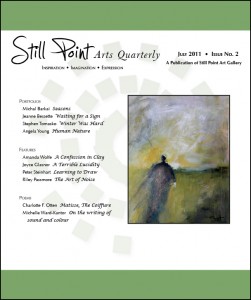 Still Point Art Gallery is a virtually art gallery that opened its first show on April 14, 2009. The Gallery presents several group exhibitions each year “organized around a topic or theme as a way to attract a wide range of artists and as a way to creatively curate the exhibitions to the online public.” The Gallery also presents work from a number of “Gallery Artists” whose submissions for exhibitions “were so skillful and engaging that they were invited to show more of their art for a longer period of time.”
Still Point Art Gallery is a virtually art gallery that opened its first show on April 14, 2009. The Gallery presents several group exhibitions each year “organized around a topic or theme as a way to attract a wide range of artists and as a way to creatively curate the exhibitions to the online public.” The Gallery also presents work from a number of “Gallery Artists” whose submissions for exhibitions “were so skillful and engaging that they were invited to show more of their art for a longer period of time.”
Still Point Arts Quarterly is The Gallery’s print publication. Along with extensive art portfolios, Still Point Arts Quarterly prints short articles and essays (approximately 400-1500 words) about art. These are not articles about art methods, techniques, art supplies, equipment, art marketing, building a website, etc., but rather The Quarterly seeks “provocative and original material that is about art, the idea of art, the making of art, being an artist, creativity, inspiration, the artist’s subject, the artist’s relation to his or her medium.”
The second issue includes art portfolios by Michal Barkai, Jeanne Bessette, Stephen and Tomasko; articles: “A Confession in Clay” by Amanda Wolfe, “A Terrible Lucidity” by Joyce Glasner, “Learning to Draw” by Peter Steinhart, and “The Art of Noise” by Riley Passmore; and poetry by Charlotte F. Otten, and Michelle Ward-Kantor.
An overview of this content is available on the publication’s website, as well as full submission guidelines for The Gallery as well as The Quarterly.
Lishanu Re-emerges
 Lishanu is an online haikai journal, presenting work across the haikai range – haiku and renku, haibun and haiga – with a significant difference: the journal is interlingual. This means that every item is published bilingually – in English and at least one other language. The goal of Lishanu is to promote haiku in a truly international way.
Lishanu is an online haikai journal, presenting work across the haikai range – haiku and renku, haibun and haiga – with a significant difference: the journal is interlingual. This means that every item is published bilingually – in English and at least one other language. The goal of Lishanu is to promote haiku in a truly international way.
Languages represented in issue #2 include Afrikaans, Croatian, Esperanto, Finnish, French, German, Hungarian, Irish, Italian, Macedonian, Nepali, Portuguese, Romanian, Russian, Serbian, Slovenian, Spanish, and Swedish.
First published online in 2005, Lishanu fell silent until now. Norman Darlington, founder and editor-in-chief, welcomes readers back with this brand new issue and a call for submissions to continue the publication. Issue #3 will be published by early 2012, but, Darlington notes, “depending on quality and quantity of submissions, we may bring this date substantially forward.”
In addition to Darlingon, the Lishanu editorial team consists of the following language editors:
Claire Chatelet (French)
Gerd Börner (German)
Jasminka Nadaškić-Djordjević (Serbian)
Tomislav Maretić (Croatian)
Maya Lyubenova (Bulgarian)
Valeria Simonova-Cecon (Russian)
Carlos Fleitas (Spanish)
Andrea Cecon (Italian)
Gemini Magazine 2011 Short Story Contest Winners
“My Beautiful, Brash, Beastly Belfast,” by Seamus Scanlon, wins the Gemini Magazine 2011 Short Story Contest and the $1,000 prize.
The second place prize of $100 goes to Paul Hellweg for “Little Chang.”
Honorable Mentions:
“Eyes Wide Open” by Colleen Quinn
“Cecilio Breaks the Law” by Mary E. Nelson
“The Stone Carver” by Ann Marie Samson
Read the winning stories and more at www.gemini-magazine.com.
New Lit on the Block :: Printer’s Devil Review
 Editor & Fiction Editor Thomas Dodson introduces the first issue of Printer’s Devil Review by presenting two stories on the origin of the term “printer’s devil” and likening the efforts of this new journal to that of the apprentice version of the story: “We are not publishing industry professionals, but rather practicing writers and artists who volunteer our time to bring work we admire to a wider audience. Because we’ve never published a journal before, we accept that we’re bound to botch pages, spill ink everywhere, and occasionally step on some toes. At the same time, we want to indicate our desire to encourage writers and artists who are, like us, in the journeyman stage of their creative careers. The magazine exists specifically to provide new and emerging writers and artists with access to publication.”
Editor & Fiction Editor Thomas Dodson introduces the first issue of Printer’s Devil Review by presenting two stories on the origin of the term “printer’s devil” and likening the efforts of this new journal to that of the apprentice version of the story: “We are not publishing industry professionals, but rather practicing writers and artists who volunteer our time to bring work we admire to a wider audience. Because we’ve never published a journal before, we accept that we’re bound to botch pages, spill ink everywhere, and occasionally step on some toes. At the same time, we want to indicate our desire to encourage writers and artists who are, like us, in the journeyman stage of their creative careers. The magazine exists specifically to provide new and emerging writers and artists with access to publication.”
The first issue, available in full online as a pdf download, features fiction by Norah Piehl, Cat Ennis Sears, Christine Gentry, and Kate Racculia, photographs by Jarrod McCabe and paintings by Sean Flood, and poetry by Franz Wright, Kendra DeColo, Laura Cherry, Chris Hall, Mary Beth O’Connor, and Suzanne Frischkorn.
You can also get Printer’s Devil Review for your iPad, iPhone, or Ipod Touch from Apple’s iBookstore for $1 download.
Additional staff members working on the publication include Fiction Editor Kate Estrop, Nonfiction Editor Chris Willard, Poetry Editors Ian Poole and Bonnie Rubrecht, Visual Arts Editors Jess Barnett and Joshi Radin, and Editorial Consultant Timothy Gager.
Printer’s Devil Review is open for submissions for their second issue until August 1.
Glimmer Train Short Story Award for New Writers Winners :: July 2011
Glimmer Train has just chosen the winning stories for their Short Story Award for New Writers. This competition is held quarterly and is open to all writers whose fiction has not appeared in a print publication with a circulation greater than 5000. The next Short Story Award competition will take place in August. Glimmer Train’s monthly submission calendar may be viewed here.

First place: James Smart [Pictured], of Hull, England, wins $1200 for “Building Butterflies.” His story will be published in the Fall 2012 issue of Glimmer Train Stories.
Second place: Andrew Bales, also of Wichita, KS, wins $500 for “The Empire Builder.”
Third place: Craig Barnes, of Portsmouth, NH, wins $300 for “The Sky and the Sun Coming Over the Earth.”
A PDF of the Top 25 winners can be found here.
Deadline soon approaching for Very Short Fiction Award: July 31
Glimmer Train hosts this competition twice a year, and first place is $1200 plus publication in the journal. It’s open to all writers, no theme restrictions, and the word count must not exceed 3000. Click here for complete guidelines.
Best of (Poetry) Blog Wanted
Northern Poetry Review (Canada) is looking for “your best piece on any subject related to poetry” for posting with a link to your blog, either in a special update or one or two at a time. No strict word limit, but somewhere between one thousand and four thousand words would be ideal.
Calls for Submission Updated
Calls for Submissions updated – lots of quality publications, anthologies, and inaugural issues looking for fresh, new, writers and established voices. Contact me if you have a CFS you’d like considered for listing: denisehill_at_newpages_dot_com
Submissions for 25 Cities Project
From the Avery website:
For four years, Avery has been publishing emerging authors alongside established ones; young writers alongside older; women alongside men; urban alongside rural. Every single page of our book is devoted to the unpublished short story, so we’ve been able to get over ninety short stories out into the world.
And yet, no matter how widely we cast the net, we’re always going to miss a few states, a few cities, a few voices. Sometimes a story’s voice is too good, too different, too true to fit into an issue.
We decided something had to be done.
The 25 Cities Project is our effort to offer readers even more variety, to encourage writers from more diverse backgrounds to throw their hats in the ring. The short story has been evolving for quite some time now, and through each phase we see changes in style, tone, mood. Above all else, though, we see and seek out changes in voice. So much depends upon who’s telling us the story, and from what vantage point they’re telling.
Visit Avery for a full list of cities, submissions received thus far (some cities still not represented!) and guidelines. PHOTOGRAPHY submissions are also being accepted.
Tupelo Press 2011 First/Second Book Award Winner
Tupelo Press has announced the winner plus runners-up and finalists of their 2011 First/Second Book Award as selected by D. A. Powell:
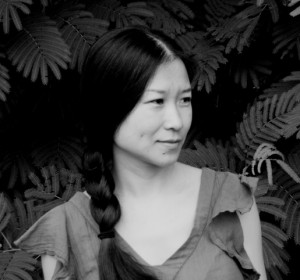 Winner
Winner
Lantern Puzzle by Ye Chun (叶春) of Columbus, Missouri [Photo Credit: Shawn Flanagan]
Runners-Up:
Malachi Black of Provincetown, Massachusetts for Storm Toward Morning
Juliette Rodeman of Columbia, Missouri for Reckless Fire
The Editors of Tupelo Press singled out for Honorable Mention Kathy Nilsson of Cambridge, Massachusetts for The Infant Scholar.
Other Distinguished Finalists:
Joseph Campana of Houston, Texas for Natural Selections (withdrew prior to judging, won the Iowa Prize)
J.L. Conrad of Madison, Wisconsin for Disaster Fruit
Rebecca Hazelton of Madison, Wisconsin for Fair Copy
Anna Journey of Fairfax, Virginia for Whisper to the Hive
Stacy Kidd of Stillwater, Oklahoma for Red House Over Yonder
David Roderick of Greensboro, North Carolina for Dear Suburb
Siobhán Scarry of Ridgewood, New Jersey for Pilgrimly
Stephanie Ellis Schlaifer of St. Louis, Missouri for Clarkston St. Polaroids
Eliot Khalil Wilson of Denver, Colorado for This Island of Dogs
This annual competition has historically been open to any poet writing in English who has not previously published a full-length collection of poetry. In 2011, in recognition of how difficult publishing a second book can be, Tupelo Press also accepted submissions of manuscripts from poets who have previously published one full-length book of poems.
Menda City Review on Hiatus
Menda City Review Founding Editor Terry Rogers writes, “It’s been a pleasure to see this little literary project I started more than five years ago grow to the mature collection of letters that it is today. But, well, my fire for this project is burning out. Upon completion of this issue, number eighteen, I’ll be taking an indefinite break from the publication of MCR. The site itself and all its contents will remain intact – I care far too much for our contributors to allow their creations to vanish, and the cost of publication has been paid for this year. There is a chance that I’ll catch my breath and resume afresh in 2012 – I am allowing for that possibility. At this point, however, I’m leaning more toward finding a suitable and reasonably-competent publisher (or college) to whom I can relinquish complete ownership and control. If you have any sincere ideas for me, please share them in an email, and I’ll certainly consider them.”
Quarterly West Becomes Online Only
Issue #70/71 – Fall 2010/Spring 2011 of Quarterly West will be their last scheduled issue in print. From now on, the magazine will be moving to an all-online venue.
New Lit on the Block :: Trigger
Christopher Lowe is the editor and Carli Castellani the artistic director of Trigger, a new bi-annual publication from Status Hat Productions that showcases fiction, poetry, and visual art. Available online, each edition of Trigger will focus exclusively on a different topic relating to the exploration of narrative’s role in the arts. The first edition, released on July 1, is a collaborative project, pairing visual artists with writers – eight artists and eight writers shared works to create 16 new creations. Each of the contributors was also asked to share notes about their process and approach to the response pieces they created as part of the project.
Contributors to this first issue include Meagan Dye, J. Bruce Fuller, Russie Wight-Waltman, Erica McCreedy, Marjorie Maddox, Hillary Joubert, Mojie Crigler, Gabrielle Grace, John Peterson, Howie Good, Emily Alford, Liam Daly, Ryan De La Hoz, Joshua Canipe, Steven Brown, and Tim Bruehl.
Ilya Kaminsky Broadside Available [Repost]
 Tupelo Press has a limited edition, dual-language broadside of Ilya Kaminsky’s “Author’s Prayer” from his collection Dancing in Odessa. Each numbered broadside has been printed by hand on Rives Heavyweight, a French mould-made 100% cotton paper. Typesetting, woodcut, and printing by Josef Berry in Free Union, Virginia, January 2011. Both unsigned and signed copies are available. You can also listen to a recording of Ilya Kaminksy’s reading of “Author’s Prayer” from the website of “From the Fishouse,” a nonprofit that promotes the aural tradition of poetry, and on YouTube, both see and hear Kaminsky reading at the Berkeley Lunch Poems series.
Tupelo Press has a limited edition, dual-language broadside of Ilya Kaminsky’s “Author’s Prayer” from his collection Dancing in Odessa. Each numbered broadside has been printed by hand on Rives Heavyweight, a French mould-made 100% cotton paper. Typesetting, woodcut, and printing by Josef Berry in Free Union, Virginia, January 2011. Both unsigned and signed copies are available. You can also listen to a recording of Ilya Kaminksy’s reading of “Author’s Prayer” from the website of “From the Fishouse,” a nonprofit that promotes the aural tradition of poetry, and on YouTube, both see and hear Kaminsky reading at the Berkeley Lunch Poems series.
Additional Note from TP: “Because we can only pray for art, but can actually do something tangible about hatred, injustice and the sufferings of children, Tupelo Press will donate 10% of every dollar received for this magnificent broadside to a worthy nonprofit organization. This month we will donate to Join with Joplin, a program designed to raise funds to assist seniors displaced or injured in the recent Joplin, Missouri tornado.”
[NP Note: I ordered a copy of this broadside, and it is GORGEOUS.]
August 2011 Postcard Poetry Festival
From Lana Ayers (and HIGHLY recommended by myself!):
The August 2011 Postcard Poetry Fest is now open for registration!
Here’s what’s involved:
Get yourself at least 31 postcards. These can be found at book stores, thrift shops, online, drug stores, antique shops, museums, gift shops. (You’ll be amazed at how quickly you become a postcard addict.)
On or about July 27th, write an original poem right on a postcard and mail it to the person on the list below your name. (If you are at the very bottom, send a card to the name at the top.) And please WRITE LEGIBLY!
Starting on August 1st, ideally in response to a card YOU receive, keep writing a poem a day on a postcard and mailing it to successive folks on the list until you’ve sent out 31 postcards. Of course you can keep going and send as many as you like but we ask you to commit to at least 31 (a month’s worth).
What to write? Something that relates to your sense of “place” however you interpret that, something about how you relate to the postcard image, what you see out the window, what you’re reading, using a phrase/topic/or image from a card that you got, a dream you had that morning, or an image from it, etc. Like “real” postcards, get to something of the “here and now” when you write.
Do write original poems for the project. Taking old poems and using them is not what we have in mind. These cards are going to an eager audience of one, so there’s no need to agonize. That’s what’s unique about this experience. Rather than submitting poems for possible rejection, you are sending your words to a ready-made and excited audience awaiting your poems in their mailboxes. Everyone loves getting postcards. And postcards with poems, all the better.
Once you start receiving postcard poems in the mail, you’ll be able to respond to the poems and imagery with postcard poems or your own. That will keep your poems fresh and flowing. Be sure to check postage for cards going abroad. The Postcard Graveyard is a very sad place.
That’s all there it to it. It’s that fun and that easy.
To get started, click here register. Once you’ve registered, you just need to login to see the list of participants.
There is also a new Facebook group for those who sign up for the activity.
New Lit on the Block :: Menacing Hedge (& Scary Bush)
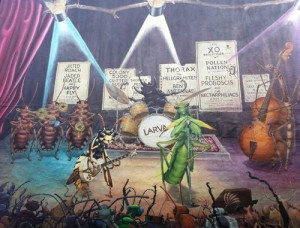 Menacing Hedge premiers from the efforts of Managing Editor Kelly Boyker, Technical Editor and Proofreader Martha Vallely, and Webmaster and Paperwork Dealer-Wither Gio Guillemette. Menacing Hedge is an online quarterly journal of poetry, fiction and artwork, that is “committed to fostering access to emerging and experimental poetry and prose.” Ongoing publication is scheduled for the first weeks of July, October, January, and April with a yearly “best of” print edition.
Menacing Hedge premiers from the efforts of Managing Editor Kelly Boyker, Technical Editor and Proofreader Martha Vallely, and Webmaster and Paperwork Dealer-Wither Gio Guillemette. Menacing Hedge is an online quarterly journal of poetry, fiction and artwork, that is “committed to fostering access to emerging and experimental poetry and prose.” Ongoing publication is scheduled for the first weeks of July, October, January, and April with a yearly “best of” print edition.
Additionally (and on the even more fun side of life), MH offers authors whose works are accepted to submit one of their “most cringeworthy efforts from the misty past to Menacing Hedge’s evil twin, Scary Bush.” Currently on Scary Bush is the poem, “The Poet” by Juliet Cook, written in high school with teacher comments in the margins.
The first issue of Menacing Hedge includes works by P. Hurshell, Nancy Ibsen, Chenelle Milford, Nathan Moore, Paul Nelson, Meg Pokrass, Julene Tripp Weaver, Lucile Barker, Leo Briones, Juliet Cook, Beth Coyote, Christine Hamm, Jeremy Halinen, and Lauren India Henley.
[Cover Image: “Larva Live” by Scott Summers]
Pre-order Anobium
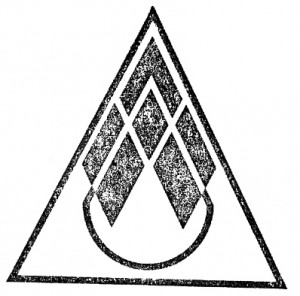 Anobium: Volume 1 (Summer 2011) is available for pre-order price of $9.99 – which includes shipping and other “random goodies” – until July 31. After that, the price is $12. Anobium will be 84pp. of new writing from Laura Carter, Jennifer L. Collins, William Doreski, Eric Evans, Ricky Garni, Jonathan Greenhause, Luke Irwin, Rich Ives, Eddie Jones, J.S. MacLean, Claire McCurdy, Bethany Minton, Thomas Mundt, Ben Nardolilli, James Payne, Stephanie Plenner, Graham Tugwell, Meredith Turits, and Susan Yount. It also features a new story and a never-before-seen interview with Chicago’s Joe Meno. The volume also features new art from Anobium’s resident illustrator, Jacob van Loon.
Anobium: Volume 1 (Summer 2011) is available for pre-order price of $9.99 – which includes shipping and other “random goodies” – until July 31. After that, the price is $12. Anobium will be 84pp. of new writing from Laura Carter, Jennifer L. Collins, William Doreski, Eric Evans, Ricky Garni, Jonathan Greenhause, Luke Irwin, Rich Ives, Eddie Jones, J.S. MacLean, Claire McCurdy, Bethany Minton, Thomas Mundt, Ben Nardolilli, James Payne, Stephanie Plenner, Graham Tugwell, Meredith Turits, and Susan Yount. It also features a new story and a never-before-seen interview with Chicago’s Joe Meno. The volume also features new art from Anobium’s resident illustrator, Jacob van Loon.
BAP Quarterly Final Issue
In her Editor’s Note, Jennifer Bal announces that the most recent issue will be the last for Bosphorus Art Project Quarterly, indicating that it is simply time “to move on in life,” and for readers to “keep a look out for our future endeavors.” The site will remain live with the current and archived issues.
Local Orlando Writers Project
Participating author Chris Wiewiora wrote to tell us about a local Orlando project: 15 Views from Orlando. He describes it as “an exquiste corpose-like story, where each week an Orlando writer writes up to 1,000 words to follow/connect to the previous week’s story as well as set up the following week. The thing is, all of it has to in some way be set in Orlando.”
Burrow Press, a new local Orlando publisher hosting this project on their website while Nathan Holic, an instructor at the University of Central Florida and local writer is the curator of the project.
Chris Wiewiora authored the second installation – currently on part six – and all will be collected into a chapbook and sold for the chairty Page 15.
[Thanks Chris!]
Front Range Hiatus
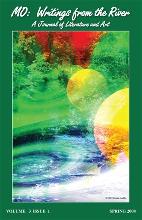 Front Range: A Review of Literature and Art, published by the Front Range Writers, a non-profit writers organization in Great Falls, MT, will be going on hiatus. Editor Frederick Bridger writes, “What started out as a campus project for my students rapidly evolved over the years into so much more…this will be our last issue for a few years.” In response to my contacting him to ask about the hiatus, Bridger says this is a planned hiatus: “I am traveling abroad for the next 2-3 years and will be unable to supervise the day to day operations, and have no one to take over for me. Upon my return we will resume.”
Front Range: A Review of Literature and Art, published by the Front Range Writers, a non-profit writers organization in Great Falls, MT, will be going on hiatus. Editor Frederick Bridger writes, “What started out as a campus project for my students rapidly evolved over the years into so much more…this will be our last issue for a few years.” In response to my contacting him to ask about the hiatus, Bridger says this is a planned hiatus: “I am traveling abroad for the next 2-3 years and will be unable to supervise the day to day operations, and have no one to take over for me. Upon my return we will resume.”
Brainstorm Poetry 2011 Contest Winners
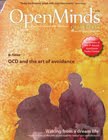 Winners of the 9th Annual BrainStorm Poetry Contest are featured in the newest issue of Open Minds Quarterly: The Poetry and Literature of Mental Health Recovery.
Winners of the 9th Annual BrainStorm Poetry Contest are featured in the newest issue of Open Minds Quarterly: The Poetry and Literature of Mental Health Recovery.
First Place: Brock Marie Moore
Second Place: Louise Lane
Third Place: Zan Bokes
Honorable Mentions will appear in the Fall 2011 issue: April Bulmer, John Laue, L.Z. Trembley, and Louise Lane.
